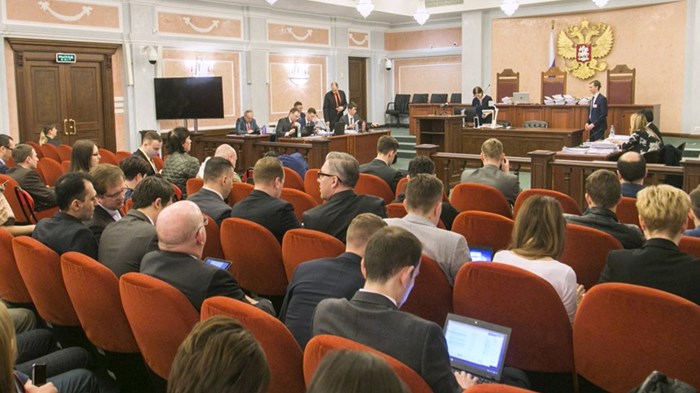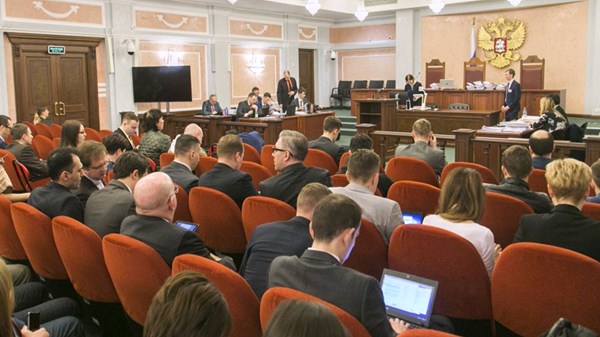

It’s official. Jehovah’s Witnesses can no longer practice their faith freely in Russia, where the Supreme Court on Thursday declared the pacifist religious organization an “extremist group” and banned all of its activity.
The judge ordered all 395 local chapters and its Russian headquarters to close and authorized the government to seize all property. Under the ruling, distributing copies of the Watchtower, discussing their beliefs in public, or even worshipping at a meeting hall has become a crime.
A lawyer for Russia’s justice ministry, Svetlana Borisova, told the court that Jehovah’s Witnesses “pose a threat to the rights of the citizens, public order and public security,” according to media reports.
The decision comes at the conclusion of 30 hours of trial over the past few weeks and about a month after the government suspended Jehovah’s Witnesses activities in March. The organization had launched a global letter-writing campaign and a lawsuit claiming political repression, but both were unsuccessful.
To human rights and religious freedom advocates around the world, the move comes as a major blow. While ties between the Russian Orthodox Church and the Kremlin have put ongoing scrutiny on all non-Orthodox faiths, this case represents the first time the country has banned a registered religious group.
In a report of the verdict on the jw-russia.org website, Jehovah’s Witnesses described the outcome of the case as “a black day for fundamental human freedoms in Russia.” They noted that “this decision could lead to the saddest consequences for believers of different faiths, as well as for Russia's image on the world stage.”
The Jehovah’s Witnesses Administrative Center has 30 days to appeal to a three-person panel at the Supreme Court, but Jehovah’s Witnesses say they anticipate serious problems, regardless of any pending appeal.
Jehovah’s Witnesses added that, if necessary, they will take their case to the European Court of Human Rights in Strasbourg.
“If Jehovah’s Witnesses are persecuted, then that means later ‘on the block’ will come other religious movements—for example, Protestant churches,” law professor Anatoly Pchelintcev told Portal-Credo, an Orthodox news site. “For the Jehovah’s Witnesses, Armageddon has arrived, and the faithful of other religions await the apocalypse.”
Russian Protestants have been more ambivalent about the legal fate of the fellow minority group, as CT previously reported.
Jehovah’s Witnesses number 175,000 adherents in Russia, while Protestants are about 4 times larger. Though they have suffered under some of the same restrictive laws (like the anti-evangelism measures enacted last year), Russian Protestants have a better reputation among Orthodox and government officials. They disagree with the Witnesses’ theology and methodology for evangelism, often seeing their tactics as annoying.
Roman Lunkin, an expert in Russian church-state relations, told Timethat it’s unlikely the government would use the extremist label against evangelicals’ literature, since they tend to use the same Bible translations as the Orthodox.
Still, some Russian evangelicals see the repression of Witnesses as reason to worry, according to William Yoder, spokesman for the Russia Evangelical Alliance. Some have brought up German pastor Martin Niemöller’s “First They Came For” poem and asked, “How soon will it hit us if we don’t protest?”
The crackdown on Jehovah’s Witnesses follows rising nationalist furor in Russia and a skepticism toward groups associated with the West.
“The treatment of the Jehovah’s Witnesses reflects the Russian government’s tendency to view all independent religious activity as a threat to its control and the country’s political stability,” according to the US Commission on International Religious Freedom (USCIRF), which condemned Russia’s ongoing campaign against the group. “This approach dates back to the Soviet period and impacts other religious groups, including peaceful Christians and Muslims.”
Known for their door-to-door evangelism, Jehovah’s Witnesses have historically been on the front line in the fight for religious freedom. They are considered a bellwether for the rights of minority faiths and public expression.
The full impact of this week’s ruling is still unfolding, though Russia has been quick to act. The government’s financial monitoring system already added the Jehovah’s Witnesses headquarters to its list of “organizations, against which there is evidence of involvement in extremist activity or terrorism,” and its financial transactions are already blocked.
In the trial, Jehovah’s Witness representatives refuted the justice ministry’s claims that the Administrative Center imported “extremist” literature, financed “extremist activity,” and failed to take effective measures against “extremist activity” by local religious organizations.
The group’s lawyer, Viktor Zhenkov, concluded his remarks by asking: “What happens if the court upholds the justice ministry’s request? If this is the will of the state, then the country successfully acquires 170,000 prisoners of conscience and a corresponding reputation. If the will of the state is to comply with the law, then the court can come to only one decision: to refuse to uphold the justice ministry’s suit.”
Another noted the violation of believers’ rights since the justice ministry issued its suspension order and expressed his fear that liquidation would lead to “even more tragic consequences.”
Additional reporting from Forum 18.

Support Our Work
Subscribe to CT for less than $4.25/month


















